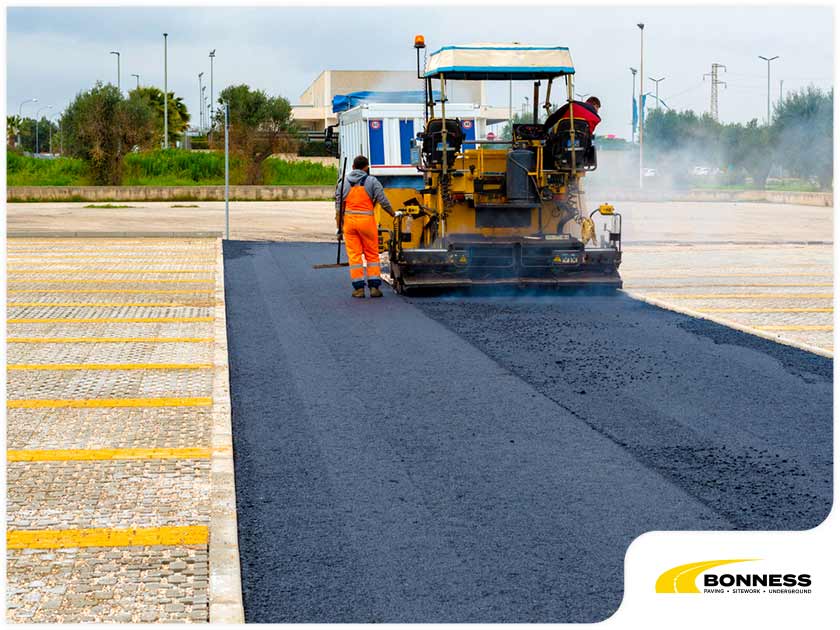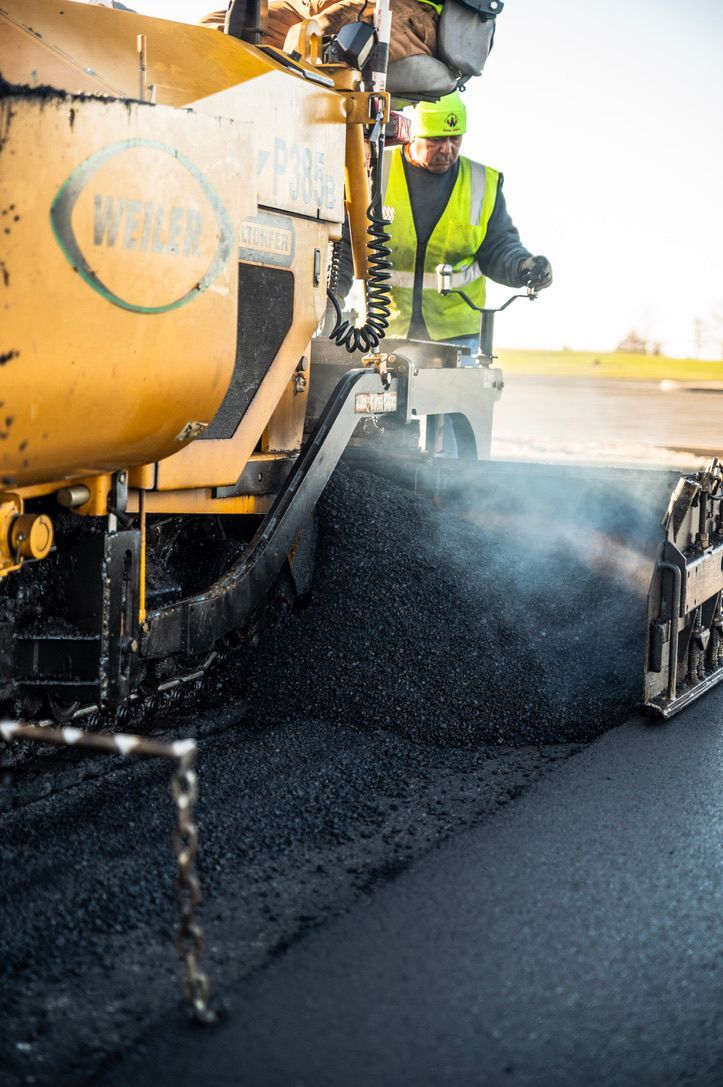Reliable Asphalt Paving Acworth GA: Ensuring Long-Lasting Results for Your Property
Reliable Asphalt Paving Acworth GA: Ensuring Long-Lasting Results for Your Property
Blog Article
Understanding the Various Sorts Of Asphalt Paving Available Today
In the world of building and construction and infrastructure, an extensive understanding of the different kinds of asphalt paving is essential for ideal task end results. From the durable Warm Mix Asphalt, made for high-traffic areas, to the environmentally conscious Porous Asphalt that helps with water administration, each type provides unique advantages tailored to particular requirements.

Hot Mix Asphalt
What makes hot mix asphalt a favored option for road building and repair work? Hot mix asphalt (HMA) is favored for its sturdiness, adaptability, and performance under varying problems. Composed of a blend of aggregates and fluid asphalt cement, HMA is created at high temperature levels, commonly in between 300 ° F and 350 ° F (asphalt paving acworth ga). This high-temperature application allows for optimal bonding and compaction, causing a smooth, resistant surface area that can withstand rush hour tons and negative climate.
HMA's capacity to be tailored to certain job needs is one more substantial advantage. Various ranks and solutions can be utilized to improve homes such as flexibility, resistance to deformation, and longevity. In addition, warm mix asphalt can be quickly set up and open up to traffic, minimizing disturbance during building.
Environmental factors to consider likewise play a duty in the preference for HMA. The product is recyclable, and redeemed asphalt sidewalk (RAP) can be reused, promoting sustainability in road building and construction methods. Overall, hot mix asphalt attracts attention as a trusted option, effectively providing a long-lasting, high-performance surface that satisfies the demands of modern infrastructure.
Cold Mix Asphalt
Cold mix asphalt is a functional alternative to warm mix asphalt, particularly suited for particular applications such as patching and surface area treatments. This type of asphalt is generated at ambient temperatures, permitting less complicated handling and application without the requirement for substantial heating devices.
Normally made up of asphalt emulsions or lessenings, cool mix asphalt can be combined on-site or acquired pre-mixed. Its buildings allow it to bind well with existing sidewalk, making it an effective service for fixing potholes, cracks, and other surface issues. In addition, it can be applied in a selection of climate condition, giving a practical alternative for year-round maintenance.

Nevertheless, while chilly mix asphalt is optimal for momentary solutions, it may not supply the very same long life or sturdiness as hot mix asphalt under hefty traffic conditions. As such, it is ideal used for low-traffic areas or as a temporary remedy until even more long-term repair work can be carried out.
Cozy Mix Asphalt
While warm mix asphalt has long been the requirement for road building, cozy mix asphalt (WMA) has actually become a cutting-edge choice that stabilizes efficiency with ecological factors to consider. WMA is produced at considerably lower temperatures-- normally in between 215 ° F and 275 ° F-- contrasted to warm mix asphalt, which is heated up to around 300 ° F. This reduction in temperature not only reduces energy consumption but also lowers greenhouse gas emissions during manufacturing.
The modern technology behind WMA entails using ingredients or methods that allow much better workability at lower great site temperatures. These can consist of chemical ingredients, lathering procedures, or a mix of both. As a result, WMA maintains the essential residential properties for longevity and efficiency while providing a more eco-friendly alternative.

Permeable Asphalt
Permeable asphalt stands for a forward-thinking strategy read this post here in sidewalk layout, focusing on both capability and environmental sustainability. This cutting-edge product is particularly crafted to permit water to permeate with its surface, successfully minimizing drainage and advertising groundwater recharge. Therefore, permeable asphalt is an exceptional option for areas susceptible to flooding or where stormwater management is crucial.
The structure of porous asphalt differs from typical asphalt, including a greater portion of voids that help with drainage. This residential or commercial property not only minimizes surface area water build-up however also aids minimize problems like hydroplaning and enhances vehicle grip throughout damp conditions. asphalt paving acworth ga. Additionally, permeable asphalt can contribute to city warm island reduction, as it enables higher evaporation and cooling results this content in city atmospheres
In regards to setup, permeable asphalt needs mindful consideration of underlying water drainage systems to make sure optimal performance. Upkeep usually involves routine inspections and cleaning up to stop blocking from particles, which can hinder its leaks in the structure. In general, permeable asphalt serves as a sustainable paving remedy that aligns with modern ecological goals, making it a progressively preferred choice for both public and exclusive jobs.
Rubberized Asphalt
Rubberized asphalt is an innovative paving material that incorporates recycled rubber, normally sourced from scrap tires, into the asphalt mix. This innovative technique not just enhances the performance of standard asphalt however additionally advertises ecological sustainability by recycling waste products. The addition of rubber enhances the adaptability and sturdiness of the sidewalk, making it immune to cracking and deformation under varying temperature level problems.
Among the substantial advantages of rubberized asphalt is its ability to decrease environmental pollution. The rubber fragments absorb sound, resulting in quieter streets, which is especially helpful in city locations. Furthermore, this type of asphalt provides improved skid resistance, enhancing security for lorries.
Rubberized asphalt additionally adds to expanding the life-span of roadway surfaces, causing lowered upkeep expenses gradually. This long life is especially beneficial for high-traffic locations where damage are increased. Furthermore, its resistance to wetness penetration helps minimize the threat of water damages, additionally improving sturdiness.
Final Thought
In summary, the selection of asphalt paving kinds-- Hot Mix Asphalt, Cold Mix Asphalt, Warm Mix Asphalt, Porous Asphalt, and Rubberized Asphalt-- each accomplish distinctive functions that deal with varied building and construction and upkeep requirements. These options not just improve road top quality however also add to sustainability with decreased power intake and improved water monitoring. Comprehending these differences is crucial for picking the suitable asphalt kind, ultimately guaranteeing efficient and efficient leading options in various settings.
From the robust Warm Mix Asphalt, developed for high-traffic locations, to the ecologically conscious Porous Asphalt that assists in water management, each kind presents unique benefits tailored to details needs.Commonly composed of asphalt solutions or cutbacks, chilly mix asphalt can be combined on-site or purchased pre-mixed.While warm mix asphalt has actually long been the requirement for roadway construction, warm mix asphalt (WMA) has actually emerged as an ingenious choice that balances performance with ecological considerations.Rubberized asphalt is a sophisticated paving product that incorporates recycled rubber, usually sourced from scrap tires, right into the asphalt mix.In recap, the variety of asphalt paving types-- Warm Mix Asphalt, Cold Mix Asphalt, Warm Mix Asphalt, Porous Asphalt, and Rubberized Asphalt-- each meet distinctive functions that cater to diverse building and construction and upkeep needs.
Report this page